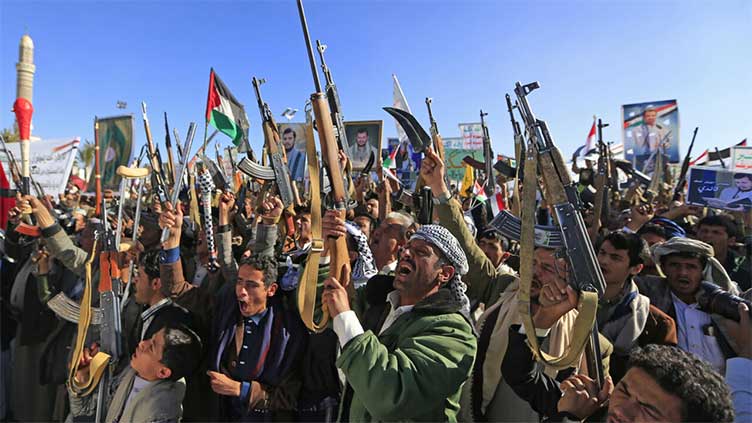Yemen's Huthi rebels declaim their defiance of Israel

World
Thousands of Yemenis crowded the capital Sanaa to express their support for Iran-backed Huthi rebels
SANAA (AFP) – Thousands of Yemenis crowded the capital Sanaa Friday to express their support for the Iran-backed Huthi rebels, who say they will maintain pressure on Israel despite the imminent Gaza ceasefire.
Every week for the past 15 months, people have filled the centre of the rebel-held city on the Muslim day of prayer and rest to chant their backing for the Palestinians.
This week, with the ceasefire awaiting final Israeli cabinet approval before coming into effect on Sunday, was no different.
The agreement brokered between Israel and Hamas would see hostages held in war-devastated Gaza being exchanged for hundreds of Palestinian prisoners held by Israel.
"We're here to celebrate the victory (of the Palestinians) and of our missiles and drones which forced Israel to halt its aggression in Gaza," said one demonstrator, Zeid al-Astout.
A Huthi rebel, Khaled al-Matri, told AFP he supported the ceasefire deal for Gaza.
But he added: "We will not give in until the disappearance of the Zionist state, God willing", before breaking into chants of "Death to America, death to Israel!"
Since the war in the Gaza Strip began after Hamas's October 7, 2023 attack on Israel, the Huthis have fired dozens of missiles and attack drones at Israel.
They have also targeted shipping in the key Red Sea and Gulf of Aden waterways that are vital to world trade.
The Huthis, who say their action is in solidarity with the Palestinians, have themselves seen their positions in Yemen hit by US, Israeli and sometimes British air strikes.
On Thursday, rebel leader Abdulmalik al-Huthi in a televised address threatened to keep up their attacks if Israel does not respect the ceasefire with Hamas.
"We will watch the implementation of the agreement, and if there are any Israeli breaches, massacres or attacks, we will be ready to provide military support to the Palestinian people," he said.
It was a speech "full of defiance", said Mohammed Albasha, founder of the US-based risk consultancy Basha Report.
'AXIS OF RESISTANCE'
He said the Huthi leader's speech suggested "the potential mobilisation of up to one million fighters and a readiness to expand operations if challenged".
Basha said the Huthis "stand ready for future rounds of confrontation".
The Huthis, originally from northern Yemen, form part of the Iran-backed "Axis of Resistance", which also includes Hamas and the Hezbollah militant group in Lebanon.
The Huthis ousted the Sanaa government in 2014 and later went on to seize large swathes of the impoverished Arabian Peninsula country.
Unlike Hezbollah, which was severely weakened in fighting with Israel before a November 27 ceasefire, the Huthis "are now an indispensable member of the Axis of Resistance", according to Thomas Juneau of the University of Ottawa.
The specialist on Yemen said the Huthis have "become much more important for Iran".
Their defiance in attacking Israel and its ally the United States over the Gaza war has boosted their popularity in Yemen, a poor nation of 30 million people who are strongly pro-Palestinian.
But backing for Yemen's rebels is not universal.
"The Huthis have never done anything positive. Their support for Gaza is the only thing enabling them to polish up their image," said 36-year-old Assem Mohammed from the Huthi-controlled Red Sea port city of Hodeida.
Hanaa Abdel Rahman, a teacher who is also from Hodeida, spoke of "this emotional boost (for the Huthis) because of their support for Palestine".
She thought Huthi attacks on Israel would continue, despite the Gaza ceasefire.
"I expect they will continue to threaten or to retaliate," she said, adding that she fears a conflagration in Yemen which has suffered a decade of civil war.
Thomas Juneau believes the Huthi attacks may cease in the short term, but he doubts this will be permanent.
"Given their regional objectives and their ideology, it is likely that they will, at some point in the future, again use the threat of attacks in the Red Sea to pressure Israel", the United States or Saudi Arabia, he said.


